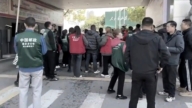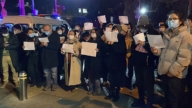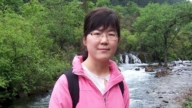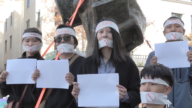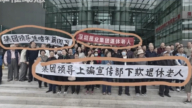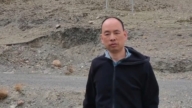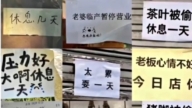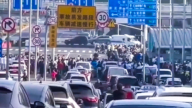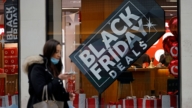【新唐人2012年12月25日訊】去年8月,大連數萬市民上街抗議二甲苯(p-xylene)化工廠項目,當時大連市政府承諾,項目停產並準備搬遷。但最近大陸媒體報導,這個引發爭議的px項目,事實上從來沒有停產過。公司還要求員工嚴格對外保密。這一消息被披露後,民眾非常氣憤,認為當局不守信用、故意欺騙老百姓。下面請看本臺記者的報導。
大連福佳集團一高管向媒體證實,公司的二甲苯(PX)化工項目一直在生產。福佳公司的一位工作人員也談到,福佳大化已恢復PX生產將近一年,不過,公司內部PX已成為禁忌的話題,員工嚴禁洩露復產消息。
大陸《新京報》報導,大連市福佳大化公司現場有滾滾濃煙升起,空氣裡瀰漫著一股嗆鼻的酸味。在大門口,公司保安對進廠人員仔細核查。公司周邊則建有數十個存放化工原料的鉛罐,工廠背後是正在修建的數千米長沿海防洪堤。
去年8月,一場颱風衝垮了大連福佳大化PX化工廠的防波堤,俗稱對二甲苯的兩個儲備罐發生傾斜洩漏,附近出現刺激性氣味。8月14號,大連數萬市民上街抗議,大連當局一面調動武警鎮壓,一面承諾將PX項目停產並準備搬離。
現在,大連PX化工廠從未停工的消息一經披露,民眾一片嘩然。網民質問:停產搬遷是市委書記當眾承諾的,是報紙頭條報導的,說不算就不算啦? !
有網民回答:“看看人家(中共)上世紀40年代的承諾,你會更加感覺慾哭無淚的。”
一位大連市民向《新唐人》透露,實際上當局一直在刻意欺騙老百姓,甚至就連當初大連數萬人上街反對PX項目,也是政府官員出於內鬥而有意組織的,所以才沒有過早遭到鎮壓。
大連市民:「老百姓都很反對這些事情,反對是歸反對,但是老百姓沒有這個勇氣站出來如何如何。如果沒有這次政府官員組織的話,他們也不敢。後來為甚麼老百姓就不出來了呢?現在還在施工呢。如果沒人組織的話,誰也不敢出去。」
《新京報》引述「清華大學化工科學與技術研究院」院長金湧的話說,PX論毒性和汽油差不多。金湧還辯稱,美國和新加坡的PX廠區都是緊鄰生活區。但這一說法招來網上一片罵聲。
《維基百科》顯示,PX是一種危險化學品,易燃有毒,可使胎兒發生畸形。PX可造成肝、腎損傷、化學性肺炎、肺水腫、血液異常等,嚴重者會因呼吸中斷而死亡。
廈門大學某化學教師也表示,從專業角度講,任何化工廠都應該遠離居住區。
廈門大學化學教師:「每一種化工廠,哪怕是做食品的、做香料的,它的化工產品濃度高的時候都有危害。因為這類化工廠總有各種意外。」
對此,記者特意致電大陸環保部環境投訴中心,詢問有關化工廠與居民區距離的相關規定。
環保部環境投訴中心工作人員:「這個要看那個化工廠建廠的時候做環評。根據化工廠的類型,環評機構做環評的時候(確定)。具體的數字,每一個廠子並不是一定的。」
但這麼重要的環評報告,對於老百姓卻像黑箱一樣,不知道如何制定,也沒有機會看到。而不斷髮生的化工廠洩露污染事件和信息的嚴重不透明,致使民眾對PX項目極度反感,當局只好悄悄低調投產。
時政評論員王昊軒撰文指出,PX本身是低毒產品,在現有技術條件下污染是可控的。但問題是,在中共的專制統治下,很多化工廠因為當局支持,根本不願在環保上投入,化工廠經常排放毒氣、毒液,民眾深受其害。王昊軒強調,PX毒性雖然低,但中共專制能起到放大PX毒性的作用。而民眾不相信PX項目的安全性,就像他們不會相信專制政府會有誠信一樣!
採訪/陳漢 編輯/李謙 後製/李月
Dalian PX Chemical Project Never Stopped
August 2011 witnessed tens of thousands of Dalian citizens
protesting against a local p-xylene (PX) chemical project.
Local authorities of the Chinese Communist Party (CCP)
promised to halt and relocate the project.
Recently, China”s media unveiled that
this PX project has actually never stopped.
The company prohibits its employees to leak the information.
The news exposure has greatly outraged local public,
as they felt they were fooled by CCP local authorities.
An executive of Dalian-based Fujia Group confirmed to media
that the company”s PX chemical project has never stopped.
Fujia staff also said that the Fujia Dahua PX has resumed
production for nearly one year.
Yet, it is a taboo subject within the company, and the staff
are banned from leaking the information to outsiders.
China”s Beijing News reported that at the operation site in
Fujia Dahua factory, dense smoke is seen.
It surges, filling the air with irritant acid odor.
The security gate guards carefully check ID of people
entering the premises.
Around the plant are dozens of lead chemical storage
tanks.
At the back of the factory is a floodwall of several kilometers
under construction.
In August 2011, a typhoon breached one of
the factory’s protective dykes.
The storm triggered a leak in its two chemical storage tanks,
the smell of irritant odor spreading to the nearby areas.
On Aug. 14th tens of thousands of Dalian protesters
took to the streets.
CCP local authorities mobilized armed police
to disperse on-site protesters.
Meanwhile, local CCP leaders promised to halt and move
the PX project out of city.
The latest unveiling of the truth about the PX project has
sparked public outrage.
A netizen said, “The Party”s chief openly promised to stop
and relocate the PX project.
This was a headline in the newspaper.
Now nothing they said counts as the truth!”
Another netizen replied, “Look at what the CCP promised
in the 1940s.You”ll find yourself tearless with grief.”
A Dalian citizen discloses why local authorities did not
repress the mass protests against the PX project in 2011.
It involving local CCP officials” infighting; some officials
were actually shoving behind the demonstration.
Dalian public: “Local people all strongly oppose this project.
But no one dares to stand up against it.
They dared not go on the streets without the official”s initiatives.
Why didn”t people go out again later on, while the project
was still under construction, waiting until today?
If no one makes a move, nobody dares to go and resist it."
The Beijing News quoted Jin Yong, president of Chemical
Science & Technology Research Institute, Tsinghua University.
Jin Yong alleged that PX toxicity is similar
to that of gasoline.
In the U.S. and Singapore, the PX factor sites
are all close to residential areas.
Jin”s assertion has turned him into a target of
public criticism on the internet.
Wikipedia shows that PX is a hazardous,
flammable and toxic chemical.
It can cause fetal malformation, liver and kidney damage,
chemical pneumonia, pulmonary edema and blood abnormalities.
High concentrations can lead to death triggered by
lung collapse.
A chemistry teacher at Xiamen University says that ethically
any chemical plant should be located far away from residents.
“Any chemical plant making food or spices can produce
ill effects with high concentrations reached in its chemical products.
For a long time, there have occurred a variety of accidents
in such chemical plants.”
NTD reporter called up the Complaint Center of China”s
Ministry of Environment to inquire about regulations on chemical factory location.
Staff (Complaint Center, Ministry of Environment): “This
depends on the environmental impact assessment that
was made to get approval for the chemical project.
There”s no specific figure set as criteria,
it may be different for each factory.”
However, the general public in China has never been
informed of such environmental impact assessments.
They neither know how it was formulated,
nor have any chance to read it.
Continuous chemical plant leak incidents and cover-up
have incurred strong public resistance.
Aware of this, CCP local authorities started production quietly.
Critic Wang Haoxuan commented in his article.
He indicated the PX in itself is of low toxicity,
with its pollution controllable.
The existing problem is, lots of CCP-backed chemical plants
are not willing to invest in environmental protection.
Chemical plants have incessantly released poisonous gas
and polluted water into the public area.
Wang Haoxuan remarked that CCP dictatorship plays a role
which helps enlarge the PX toxicity issue.
Chinese public dare not trust the alleged PX project safety,
the same as their attitude towards the autocratic regime.



